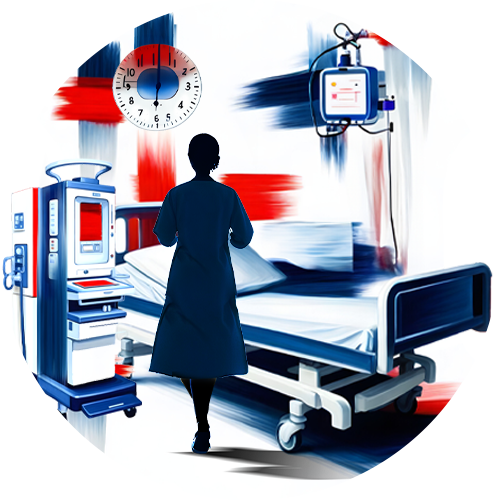On Call — Chapter 9: What We See
| June 4, 2024I’m learning to look past the grime, the tattered clothes, the strangeness, and the fleas (although that last one isn’t easy)

As told to Shoshana Gross
“I’M sick!” Maria says petulantly. “My neck really hurts!” She pulls at the collar of her filthy coat and gives a theatrical groan for emphasis.
“Let me take a look,” I say calmly, but I already suspect that the problem has nothing to do with her neck.
You see, I know Maria well. She’s one of the regulars at the ER, the people who keep drifting in and out from the grimy streets of the city into the sterile halls of the hospital. When the weather grows chilly, Maria shows up in layers of clothing, dirty black coat over nondescript gray sweater over shapeless, greenish blouse over mustard-yellow T-shirt. Something’s always bothering her. One day it’s her neck, but at other times it’s her chest or her stomach. Last time she complained about her left foot, shod in a cracked man’s rubber boot. The time before that it was her ear.
Maria, at least, is relatively calm. She doesn’t scream abuse at me or try to lash out at the nurses. Still, I try to examine her from a distance, if possible. The stench of unwashed clothing, skin, and hair permeates the room, and I can see the lice crawling through her short, graying hair. I’m grateful for the sheitel I wear, glad that at least there are no bedbugs or fleas on her clothing (that I can see). When those insects are crawling on my ER patients, I won’t go into any bedroom at home until I’ve had the longest, hottest shower I can stand.
But we’re not unique. Anyone working in the ER sees the homeless, sees the broken addicts who live in the warmth of the subway until the police unceremoniously sweep them out with the coming of nighttime. Like every hospital ER, we have our people whom we all know and recognize.
There’s Paul, the heavyset, olive-skinned man we just discharged this afternoon. He came in with several abrasions on his back after a chair broke under him as he drank a coffee at a café — or so he said. Treatment done, he’s gone off to speak to his lawyer and sue the café (the lawyer is imaginary — we’re not sure about the café).
Melissa: young and in her twenties, although she looks much older. Her blonde hair is pulled back in a matted ponytail, her skin pallid on a gaunt face. Melissa has epilepsy, with occasional seizures, but she refuses to take medication for her condition. None of us knows where she lives; she might be one of the homeless people who crowd the train stations around the city. All we know is that every few weeks she’s brought in, in the grip of a seizure. Last week it was two medics who brought her, shaking and jerking convulsively. After her usual dose of medication, she’s back on the streets.
Andrew is a quiet man who’s always being found on the sidewalk, passed out after his latest drinking spree. He comes in, we check his vitals, keep him stable, he sleeps off the alcohol, and he leaves. We know he’ll be back again.
And sometimes people come because they’re hungry. Anyone seriously ill can claim a hospital bed and a solid meal — but the ER fridge is stocked with sandwiches and juice, because hungry patients are often ill-tempered, unreasonable, and less apt to tell the truth.
Gerald was just thrown out of the ER yesterday. He claimed he had chest pain, but while being prepped for chest X-rays, he started screaming for food and trying to strike the attending nurse. Security escorted him from the ER, because while anyone can come in, violence doesn’t get to stay.
But I know Maria, and she’s never raised a hand against anyone. Even though she can be incoherent, she’s usually calm and even-tempered.
“My neck hurts,” she repeats stubbornly, and I see a flicker of fear in her eyes. She’s afraid I’ll make her leave after I examine her and find nothing amiss.
It’s cold outside, and Maria wants to be warm.
I gaze at her for a few moments, this dirty woman cowering on the clean, white sheets of the ER bed.
“Would you like a sandwich, Maria?” She nods eagerly, black eyes darting to my face in mute appeal. “All right,” I tell her. “I’ll get you a sandwich, you eat it, and then you can sleep here for a little bit. But then you have to go. You know you can’t stay.” She knows.
As I hurry to the fridge to get Maria’s sandwich, I’m struck by the realization: This isn’t what I expected when I began med school. As a fresh college student, I thought being a doctor was all about stitching wounds and diagnosing illness. I never dreamed how much of ER medicine is not about treating people’s problems, but about trying to see past them.
I’m learning to look past the grime, the tattered clothes, the strangeness, and the fleas (although that last one isn’t easy). I only interact with these people for a short time. I’ll never fully understand how Maria became Maria, and what led her to this state. And the truth is, it doesn’t really matter.
Even more than treatment for a nonexistent sore neck, what Maria — and everyone — needs is to be treated as a human being. To know that someone cares.
So I bring her the sandwich, let her sit on the bed for a while, where she nods off in the warmth of the clean, bright room with the pretty patterned curtains — and then I gently shake her awake.
“Maria, it’s time to leave. You’ve been here long enough,” I tell her. For a moment I’m worried she’s going to protest, but she slowly gets up and makes her way to the door.
I follow her down the hallway, making sure she reaches the exit, keeping an eye on the disheveled black coat as it passes through the swinging doors into the frigid air outside.
But just before she leaves, so quickly I almost miss it, she turns around and smiles.
The characters in this series are composites; all the stories are true.
(Originally featured in Family First, Issue 896)
Oops! We could not locate your form.


